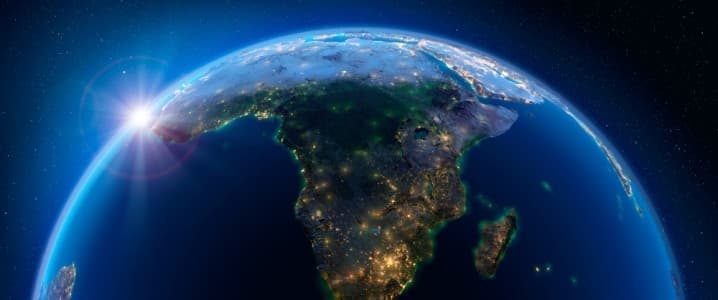Sub-Saharan Africa is responsible for just 3% of all global greenhouse gas emissions, but is heating up faster than anywhere else on the planet. Africa is particularly vulnerable to climate change, not only because it’s heating up first and fastest, but because the largely under-developed continent lacks the infrastructure and capital capacities to prepare for, mitigate, and adapt to the changes.
At the COP26 climate conference in Glasgow, the harsh reality for African leaders was pushed to the fore. Rich nations, responsible for the vast majority of the world’s overall greenhouse gas emissions, pushed for poorer countries to pledge to phasing out fossil fuels, while leaders of poor countries argued that they will have no chance of meeting their baseline development goals without the continued (and relatively minor) use of coal, oil, and gas.
“When they say cut [emissions] in Africa, what do they want to cut?” asked Titus Gwemende, Zimbabwe-based climate director at the Open Society Foundation, in an interview with the New York Times. “There’s nothing to cut here. African countries are the ones on the receiving end of this problem. It’s the bigger emitters that should have the responsibility to cut,” he said. “We should be sensitive to history.”
In the final version of the COP26 climate agreement, developed countries agreed to financially support climate action in developing countries, pledging to mobilize climate finance “from all sources to reach the level needed to achieve the goals of the Paris Agreement, including significantly increasing support for developing country Parties, beyond $100 billion per year.” Notably, a similar pledge was made in 2009, but developing nations missed their payment deadlines. Meeting these payments, as well as coming to an agreement about what qualifies for climate finance, is essential for rebuilding trust between developed and developing countries.
African leaders are now in the awkward and uncomfortable position of lobbying for the continued use of and reliance on fossil fuels, including coal, at the very same time that their nations are under dire and increasing threat from the consequences of climate change. While this may seem like hypocrisy, these leaders argue that the real hypocrites are the world leaders from developed nations who contributed most to greenhouse gas emissions and now want to control the industrial development of poorer nations who have not had the same chance to build up their own economies.
Related: Rosneft Sees Possible Supercycle In Oil And Gas Markets
“Efforts to restrict fossil fuel investments in Africa are even harder to stomach because many of the wealthy countries behind them — including Japan, the United Kingdom, and the United States — include natural gas in their own multi decade plans to transition to clean energy,” Nigeria’s vice president Yemi Osinbajo wrote in Foreign Affairs in anticipation of the COP26 talks. Another defender of African fossil fuels, Blackwater Worldwide’s Erik Prince, echoed this sentiment, saying that when richer climate advocates finger-wag from their Teslas, telling Africa “to turn away from hydrocarbons --- it’s immoral, it’s wrong,” Prince said. “We have real energy poverty across the continent.”
This is not to say that African leaders are speaking out against renewables--far from it. Renewables are simply further out of reach for these impoverished nations who need cheap and reliable energy now, and are sitting on top of plentiful reserves of fossil fuels that have yet to be developed. It’s the very definition of a wicked problem. The extraction of fossil fuels does need to end in the immediate term if we are to avoid the most devastating effects of climate change, but not all countries are prepared to carry the burden of this transition without seriously compromising the wellbeing of their citizens.
This is just one reason why COP26 ended “with nobody really happy.” Developing nations, with China and India at the fore, pushed to water down the agenda, changing the language from “phasing out” coal to “phasing down.” The pledges are still a far cry from what will be necessary to keep global warming under 1.5 degrees Celsius above pre-industrial averages. And poorer countries are still looking at a difficult and unclear road ahead on their tightrope walk between development and decarbonization.
By Haley Zaremba for Oilprice.com
More Top Reads From Oilprice.com:
- Chinese Crude Oil Imports Drop To Three-Year Low In October
- Natural Gas Prices Soar As Putin Punks Europe
- Why Uranium Stocks Are Soaring


















